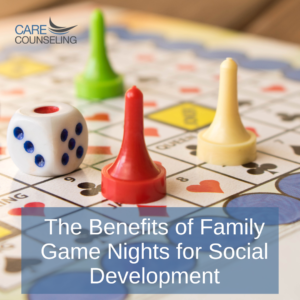The Benefits of Family Game Nights for Social Development
 In a world filled with digital distractions, busy schedules, and individual screens, it’s essential to find ways to bring families together. One timeless and effective way to do that is through family game nights. These evenings of fun and bonding offer numerous benefits, including significant contributions to social development.
In a world filled with digital distractions, busy schedules, and individual screens, it’s essential to find ways to bring families together. One timeless and effective way to do that is through family game nights. These evenings of fun and bonding offer numerous benefits, including significant contributions to social development.
- Encourages Face-to-Face Interaction
One of the most apparent benefits of family game nights is that they encourage face-to-face interaction. In an age dominated by screens, where family members can easily become engrossed in their devices, game nights provide an opportunity to sit down and converse with one another in person. This real-world social interaction is crucial for building and maintaining relationships.
- Promotes Communication Skills
Playing board games, card games, or team-based activities requires effective communication. Family members must talk to one another, share ideas, make plans, and strategize together. These interactions naturally improve communication skills, from listening to expressing oneself clearly.
- Enhances Teamwork and Cooperation
Many family games involve teamwork and cooperation. Whether you’re working together to solve a puzzle, compete as a team, or negotiate alliances in board games, these experiences teach family members the value of working together toward a common goal. These skills are transferable to many real-life situations.
- Teaches Problem-Solving
Games often present challenges, puzzles, and strategic decisions that require problem-solving skills. When families come together to solve these challenges, they encourage the development of critical thinking and creative problem-solving skills. Children, in particular, can benefit from these intellectual exercises.
- Encourages Healthy Competition
Competition can be a healthy way to learn about winning and losing gracefully. Family game nights provide a structured and supportive environment where family members can engage in friendly competition. Learning to compete while still showing sportsmanship is a valuable life skill.
- Strengthens Bonds
Regular family game nights strengthen family bonds. Sharing these enjoyable moments and creating lasting memories can bring family members closer together. It’s an opportunity to celebrate each other’s victories, console one another in defeat, and enjoy each other’s company without the distractions of everyday life.
- Creates Traditions
Family game nights can turn into cherished family traditions. Over time, they become anticipated and well-loved events. These traditions contribute to a sense of continuity and stability within the family, creating a strong foundation for social development.
- Provides Inclusivity
Family games come in various forms and can be adapted to suit the interests and abilities of all family members, regardless of age. Whether it’s a simple board game for young children or a more complex strategy game for older family members, there are games suitable for everyone. This inclusivity promotes family unity.
- Teaches Empathy and Sportsmanship
Family game nights offer opportunities to practice empathy and sportsmanship. Children can learn to recognize and understand the feelings of their family members. They can also learn how to be gracious winners and losers, showing respect and consideration for others.
- Digital Detox
Family game nights provide an excellent opportunity for a digital detox. They offer a break from screens and digital devices, allowing family members to engage in a low-tech, real-world activity. This break from screens can lead to increased physical activity, improved sleep patterns, and better face-to-face communication.
- Educational Benefits
Many family games have educational components. They can enhance learning and problem-solving skills, as well as improve memory and concentration. Educational games can make learning fun, and the entire family can benefit from these activities.
- Builds Trust and Unity
Playing games together fosters trust and unity. It allows family members to work toward common goals, demonstrate reliability and consistency, and create a sense of belonging. Trust and unity within the family are critical for social development.
- Offers a Safe Space for Expression
In a comfortable and relaxed setting like a family game night, family members may feel more at ease expressing themselves. They can share their thoughts, emotions, and ideas, knowing that they are in a supportive and non-judgmental environment.
Family game nights offer numerous advantages for social development and family bonding. They encourage face-to-face interaction, promote communication skills, enhance teamwork and cooperation, teach problem-solving, and create opportunities for healthy competition. These evenings also strengthen family bonds, establish cherished traditions, and provide a safe space for self-expression.
Whether it’s a simple card game, a strategy board game, or a team-based activity, family game nights can become a cherished and meaningful part of family life. They bring family members together, teach essential life skills, and create lasting memories. In a world where screens often dominate our attention, these analog gatherings provide an invaluable opportunity to connect and grow together as a family.



























